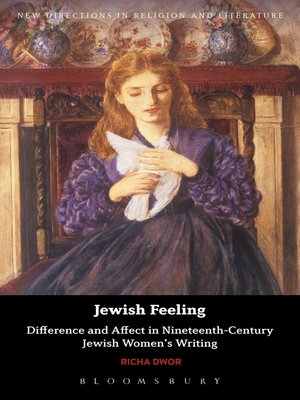Jewish Feeling
ebook ∣ Difference and Affect in Nineteenth-Century Jewish Women's Writing · New Directions in Religion and Literature
By Richa Dwor

Sign up to save your library
With an OverDrive account, you can save your favorite libraries for at-a-glance information about availability. Find out more about OverDrive accounts.
Find this title in Libby, the library reading app by OverDrive.



Search for a digital library with this title
Title found at these libraries:
| Library Name | Distance |
|---|---|
| Loading... |
Jewish Feeling brings together affect theory and Jewish Studies to trace Jewish difference in literary works by nineteenth-century Anglo-Jewish authors. Dwor argues that midrash, a classical rabbinic interpretive form, is a site of Jewish feeling and that literary works underpinned by midrashic concepts engage affect in a distinctly Jewish way. The book thus emphasises the theological function of literature and also the new opportunities afforded by nineteenth-century literary forms for Jewish women's theological expression.
For authors such as Grace Aguilar (1816-1847) and Amy Levy (1861-1889), feeling is a complex and overlapping category that facilitates the transmission of Jewish ways of thinking into English literary forms. Dwor reads them alongside George Eliot, herself deeply engaged with issues of contemporary Jewish identity. This sheds new light on Eliot by positioning her works in a nexus of Jewish forms and concerns. Ultimately, and despite considerable differences in style and outlook, Aguilar and Levy are shown to deploy Jewish feeling in their ethics of futurity, resistance to conversion and closure, and in their foregrounding of a model of reading with feeling.
For authors such as Grace Aguilar (1816-1847) and Amy Levy (1861-1889), feeling is a complex and overlapping category that facilitates the transmission of Jewish ways of thinking into English literary forms. Dwor reads them alongside George Eliot, herself deeply engaged with issues of contemporary Jewish identity. This sheds new light on Eliot by positioning her works in a nexus of Jewish forms and concerns. Ultimately, and despite considerable differences in style and outlook, Aguilar and Levy are shown to deploy Jewish feeling in their ethics of futurity, resistance to conversion and closure, and in their foregrounding of a model of reading with feeling.







